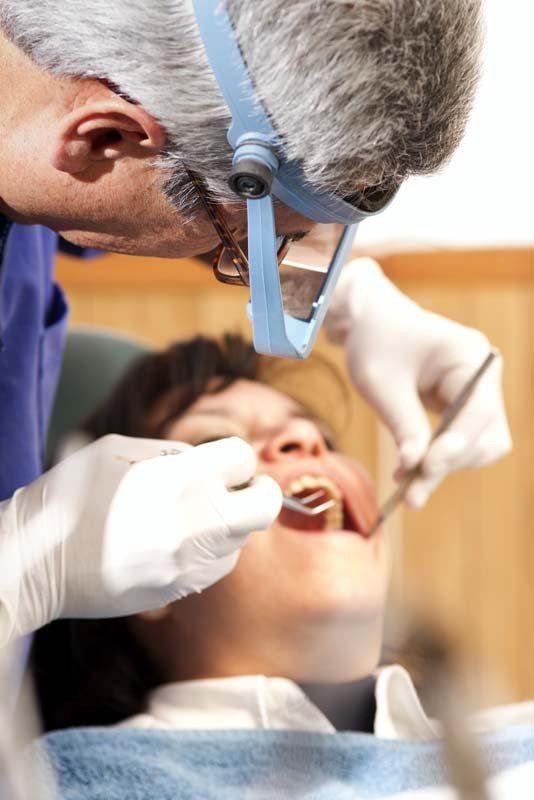Dental Emergencies
Dental Emergencies
Treating Dental Emergencies in Freeport
Dental emergencies and traumatic injuries can be painful and stressful, or life threatening at worst, depending on the situation. Toothaches can be debilitating, and strong trauma can be devastating to the structure of the face. Herrmann Dental Associates has the tools necessary to treat your dental emergency.
Toothaches
A “toothache” is pain typically around a tooth, teeth or jaws. In most instances, toothaches are caused by a dental problem, such as a dental cavity, a cracked or fractured tooth, an exposed tooth root, or gum disease. Sometimes diseases of the jaw joint (temporomandibular joint), or spasms of the muscles used for chewing can cause toothache like symptoms.
The severity of a toothache can range from chronic and mild to sharp and excruciating. It can be a dull ache or intense. The pain may be aggravated by chewing or by thermal foods and liquids which are cold or hot. A thorough oral examination, proper tooth testing and evaluation, along with appropriate dental X-rays, can help determine the cause. What we want to know is whether the toothache is really coming from a tooth or somewhere else.
The pulp, or soft inner tissue, is important during the tooth's development. Once a tooth is fully mature, the tooth can survive without the pulp because the tooth is nourished by tissues surrounding it. The pulp is normally surrounded and protected by a layer of dentin.
Above the gum line, the dentin is protected by a layer of enamel; below the gum line the dentin is covered by cementum. When a crack or cavity destroys these protective layers, the pulp is exposed to irritants and bacteria in your mouth. This can result in inflammation then infection, and, eventually, an abscess. Periodontal (gum) disease or a severe blow to the tooth can also damage the pulp. Endodontic therapy removes the damaged pulp and usually the tooth returns to a healthy condition.
If an abscess was present before treatment the healing process may take up to 2 years.
Extractions
General Procedure
When restoration procedures such as root canal therapy, crowns, or fillings are not enough to save a tooth, it may need to be pulled, or extracted.
Tooth extraction procedures today are far less painful than ever before, thanks to powerful anesthetics and sedatives. In many cases, a patient who has tooth pulled experiences little or no discomfort, and only minor bleeding.
Before a tooth is extracted, the area surrounding the tooth is numbed with a topical/and or injectable anesthetic such as Novocaine.
Patients with extracted teeth sometimes need to take an antibiotic, and at the very least, take precautions following the procedure to ensure that infection doesn't occur.
Smoking, vigorous brushing and rinsing, and drinking liquids through straws are discouraged during the post-operative period because they hinder healing and may cause the wound to open. Cold compresses applied to the outside cheek near the extraction area can help reduce any swelling and promote faster healing.
Wisdom Teeth
Wisdom teeth are the third and final set of molars that erupt in the back corners of the upper and lower normal adult mouth. Unfortunately, most people experience problems from wisdom teeth; in most cases, this is because the teeth erupt too close to existing permanent teeth, causing crowding, improper bites, and other problems.
If you experience any of the following symptoms, you may have an impacted wisdom tooth:
- Facial swelling
- Infection
- Pain
- Gum swelling
Traumatic Injuries
Dislodged Teeth
Injuries to the mouth can cause teeth to be pushed back into their sockets. If the tooth is pushed partially out of the socket, a dentist may re-position and stabilize your tooth. If the pulp remains healthy, then no other treatment is necessary. However, if the pulp becomes damaged or infected, root canal treatment will be required. Root canal treatment is usually started within a few weeks of the injury and a medication, such as calcium hydroxide, will be placed inside the tooth. Eventually, a permanent root canal filling will be placed and the canal will be sealed.
Avulsed Teeth
If an injury causes a tooth to be completely knocked out of your mouth, it is important that you seek treatment immediately! It is important to keep the avulsed tooth moist. If possible, put it back into the socket. A tooth can be saved if it remains moist. You can even put the tooth in milk or a glass of water (add a pinch of salt). Root canal treatment may be necessary based upon the stage of root development. The length of time the tooth was out of your mouth and the way the tooth was stored may influence the type of treatment you receive and the success of the outcome.

In The Face Of A Dental Emergency, Call 516-378-3200 For Immediate Assistance!
Office Hours
•••
Monday: 9:00am - 6:00pm
Tuesday: 9:00am - 6:00pm
Wednesday: 9:00am - 6:00pm
Thursday: 9:00am - 6:00pm
Friday: Closed
Saturday: 9:00am - 4:00pm
Sunday: Closed
Web Design by Newsday Connect, All Rights Reserved
